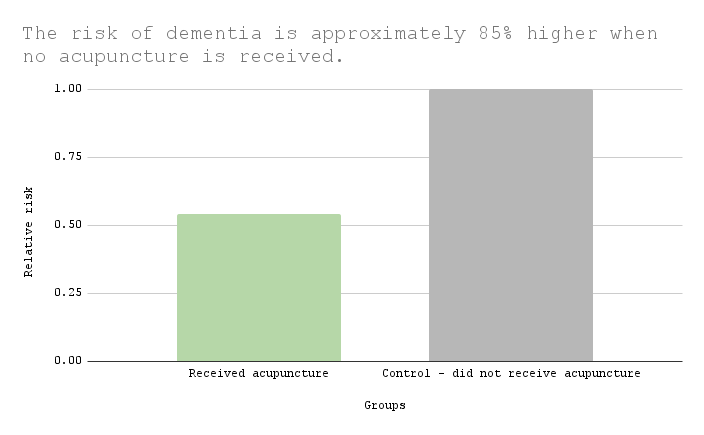Acupuncture and Dementia: How this treatment reduces the risks
New studies shed light on acupuncture’s potential to protect against dementia, particularly among those battling insomnia and migraines. Additionally, in those who develop the condition, electro-acupuncture almost halfs the risk of disability.
Acupuncture reduces risk of dementia in patients with insomnia
Chronic sleep problems can muddy the waters of cognitive health, increasing the risk of dementia over time. But acupuncture might just be the lighthouse for patients with insomnia, offering them protection. A very large new study, conducted by a team from China Medical University Hospital in Taiwan and published in the Journal of Traditional and Complementary Medicine, sheds light on acupuncture’s potential to protect against dementia, particularly among those battling insomnia.
The study aimed to investigate whether this TCM treatment is associated with a reduced risk of developing dementia in patients who suffer from insomnia.
The researchers collected real-world data from over 30,000 patients diagnosed with insomnia to conduct a propensity-score-matched cohort study. This approach carefully aligned two groups—one receiving acupuncture and the other not—ensuring that both were balanced in demographic and health characteristics, isolating the effects of this natural therapy on dementia risk. The meticulous work uncovered a striking 46% decrease in dementia risk for the acupuncture group. This means that the relative risk in those who did not receive acupuncture is 85% higher compared to the patients who received this treatment.
Acupuncture has long been recognised for its ability to promote relaxation and improve sleep, both crucial for cognitive health. The study suggests that regular sessions could help individuals with insomnia establish healthier sleep patterns, potentially fortifying their cognitive function and reducing risk of dementia.

Acupuncture has long been recognised for its ability to promote relaxation and improve sleep, both crucial for cognitive health. The studies suggest that regular sessions could help individuals with insomnia establish healthier sleep patterns, potentially fortifying their cognitive function and reducing dementia risk. The study was published in Journal of Traditional and Complementary Medicine in May 2023.
Acupuncture reduces the risk of disability
This recent study investigated whether acupuncture therapy could reduce the risk of developing significant disability among patients diagnosed with dementia. Disability, defined in this research by the requirement for devices such as a urinary catheter, nasogastric tube, or tracheostomy tube, is a serious complication for which preventive measures are currently lacking.
The researchers performed a large, long-term analysis using a nationwide health database in Taiwan, looking at 9,760 newly diagnosed dementia patients. Patients were divided equally into groups that either received acupuncture treatment or did not. The findings demonstrated a significant association between acupuncture and better outcomes: dementia patients who received acupuncture treatment had a lower risk of disability development compared to those who did not.
This protective effect was substantial, the risk of disability development is approximately 53.85% higher for patients who do not receive acupuncture. Interestingly, electro-acupuncture, the kind we use at our rooms, was significantly more effective. The risk of disability development is approximately 1.96 times higher in patients who did not receive electroacupuncture compared to those who did. Importantly, this result was consistent across various subgroups, including patients of different ages, sexes, income levels, and those with underlying health conditions like diabetes, hypertension, or stroke. These results suggest that incorporating acupuncture could be a valuable part of care programs for dementia management.
Acupuncture for patients with migraines and dementia risk
Another significant study by the same author Cheng-Hao Huang and colleagues from Taiwan, used a similar approach to explore the effects of acupuncture in a different patient group. This study utilised Taiwan’s National Health Insurance Research Database to investigate the incidence of dementia in patients with migraine, who either received or did not receive acupuncture treatment. The results from this large-scale study revealed that patients with migraine who received acupuncture had a substantially lower risk of developing dementia, with an adjusted hazard ratio of 0.51. This suggests a 49% reduction in dementia risk among the acupuncture group compared to those who did not undergo this treatment. This robust evidence underlines the potential of acupuncture as a preventive treatment against dementia in individuals with migraine, further highlighting neuroprotective role of this natural approach.


